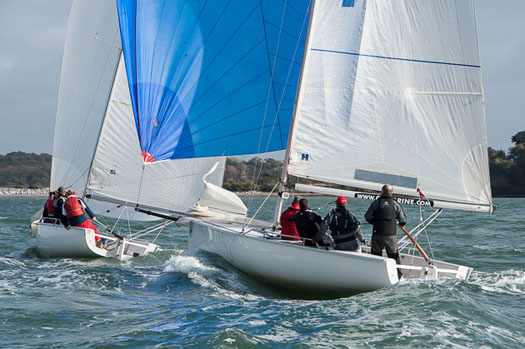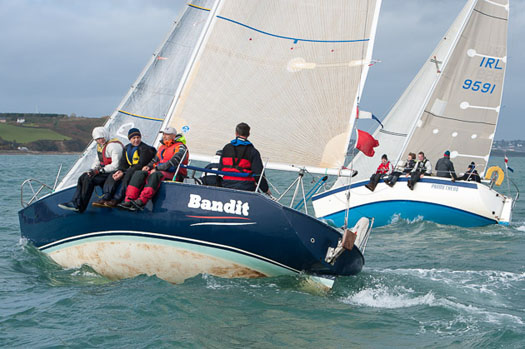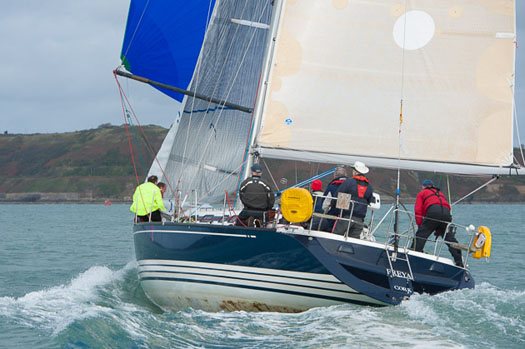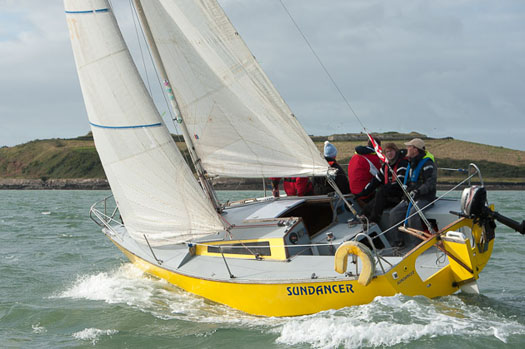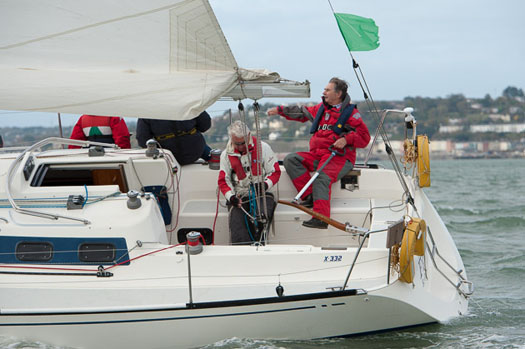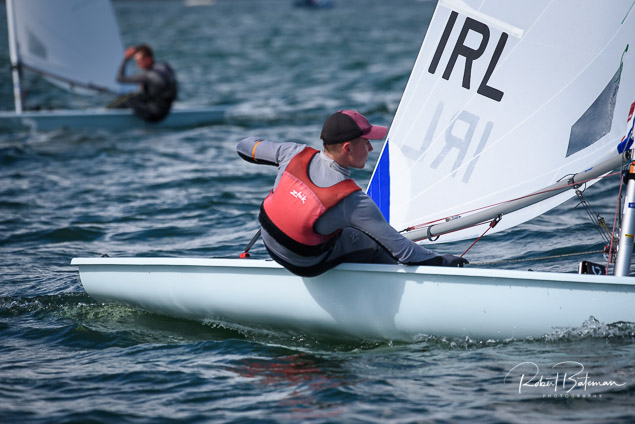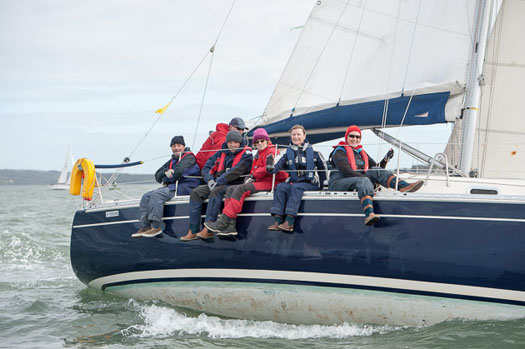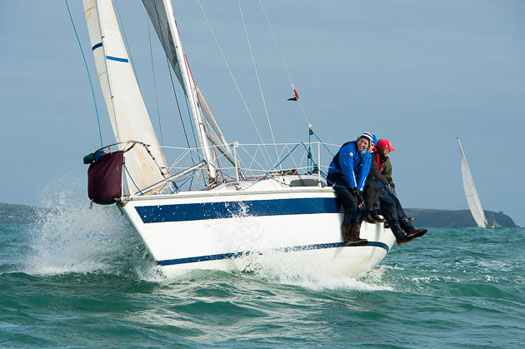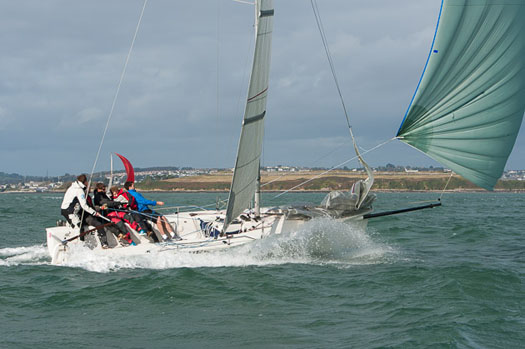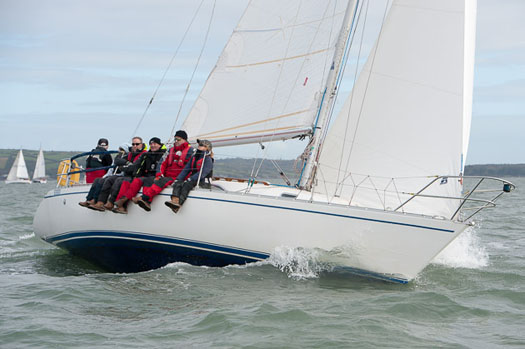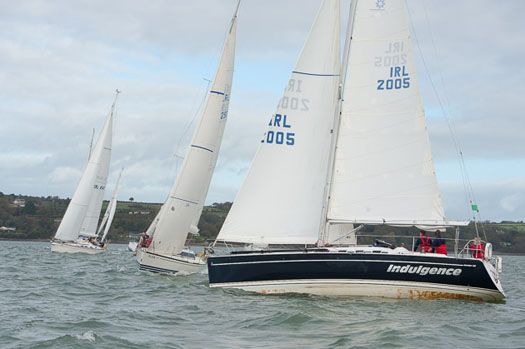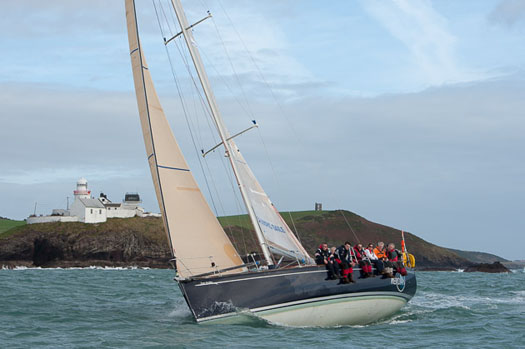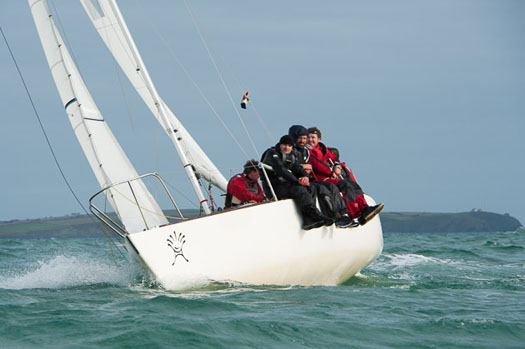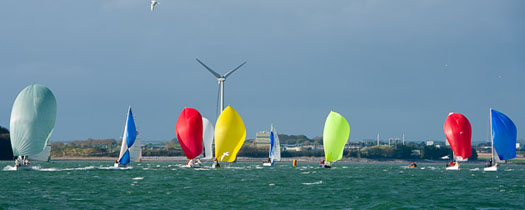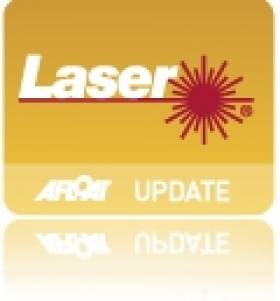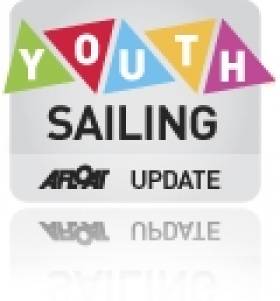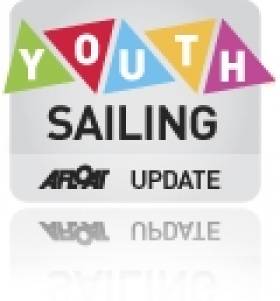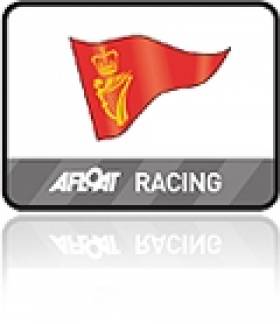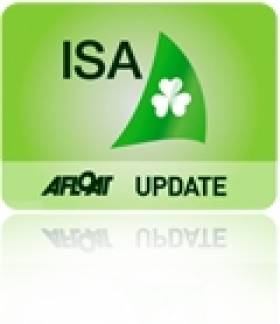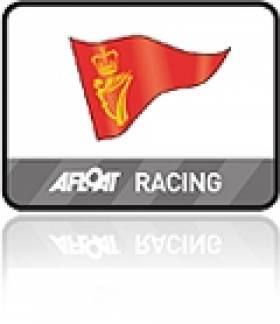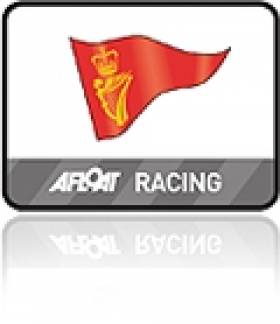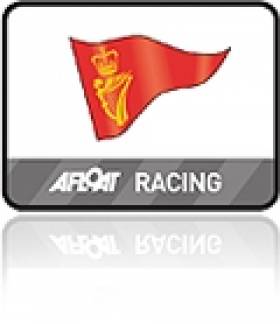Displaying items by tag: RCYC
#laserulsters – Royal Cork's Nick Walsh was the winner of the Ulster Laser Championships staged by Lough Erne Yacht Club in the last weekend of April. The three rig event provided racing for 4.7s, radials and full rigs. After six races over the two days in light and fickle conditions (with the odd 20knt squall thrown in for good measure) Royal Cork's Richard McGinley was crowned Ulster 4.7 Champion with three firsts, a second and sixth (discarding an OCS). Clubmate Nick Walsh was also crowned Ulster Champion in the Standard Rig with five firsts and a second. The radial title also went to the south coast with Ciaran Finnegan of Waterford Harbour Sailing Club winning by four clear points from Strangford Lough's Laura Gilmore. Full results are downloadable below as a pdf file.
#cruiserracing – Can you successfully incorporate a full-blown National Championship into an established neighbourhood regatta? We're going to find out from June 24th to 27th, when the ICRA Nationals and the Sovereigns Cup in Kinsale are combined into one four day event, the result of the joint efforts of two sets of organisers and administrators. W M Nixon takes a look at how this situation has developed and discovers four of the top men in the marine and sailing scene have significantly different views as to how big regattas and the ICRA Nationals should be staged.
The Irish Cruiser-Racer Association emerged from an attitude of complete realism about the contemporary sailing scene in 2002. Back then, the Irish economy was starting to develop a head of steam, and people were buying potent performance-cruisers which just begged to be raced offshore. Yet changing social attitudes meant that the traditional concept of an offshore racing crew being prepared to spend seven or eight long weekends away every summer campaigning the boat in classic offshore races simply wasn't acceptable in the new world of shared family responsibilities.
But the short-lived ideal of making classic offshore racing more family-friendly was also soon seen as unattainable except for those few extra special family crews – we can all think of one or two examples - whose very uniqueness in their shared enthusiasm for rugged offshore sailing day and night only serves to emphasise that what they like doing is simply not for the majority of sailing families.
For sure, we admire them without reservation. But we know that it won't float our family's boat. For although the totality of Irish "cruiser-racers" in 2002 included several out-and-out racing machines which were vigorously campaigned inshore and offshore, the reality is that most of the fleet were the sailing equivalent of those 4x4 SUVs which block up the parking in many a leafy and affluent suburb.
Usually, the most adventurous outing such vehicles will go on is the daily school run. There's no way their loving owners plan an aggressive demonstration of their pride-and-joys supposed off-road ability. But they do seem to find it reassuring to know that if for some reason they suddenly have to go across rough terrain, the vehicle can manage it even if the driver is scared stiff. And of course, in the unlikely event that a horse-box needs to be towed – well, no problem......
So, thirteen years ago as sailing's equivalent of the SUV began to take over marinas, two leading figures in sailing administration realised that, far from changing the new increasingly family-oriented way of doing things and forcing boats well capable of going offshore to do so even if their crews didn't particularly want to, what was needed instead was a new kind of event to suit the way that most people wanted to sail with their new performance cruisers.
The late Jim Donegan of Cork, Commodore of the South Coast Offshore Racing Association, was ocean racing aristocracy – his grandfather Harry owner-skippered the 18-ton cutter Gull to third place overall in the first Fastnet Race in 1925, and consequently became one of the founder members of the Ocean Racing Club which six years later in 1931 became the RORC, while Jim himself was to go on to win many an offshore contest.
Fintan Cairns of Dun Laoghaire has given generously of his energy and time over the years to sailing both as an active participant, a race officer, and an administrator – he was Commodore of Dublin Bay Sailing Club at a period of its healthiest expansion. Like Jim Donegan, in 2002 he was hugely enthusiastic about racing boats with lids, and he loved the offshore game. Yet in the Autumn of 2002, the two of them convened a national assembly in Kilkenny in order to form an organization whose primary aim would be to create the kind of event that would be attractive to the new generation of cruiser-racer owners, people whose boats could go offshore, but preferred the nice regatta atmosphere and home-to-port-at-the-end-of-the-day format.
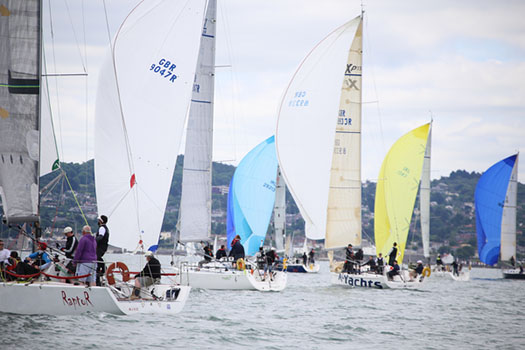
A nice regatta atmosphere, and back to port at the end of the day.....the racing in the ICRA Nationals 2014 at the Royal Irish YC in Dun Laoghaire neatly captures the purpose of the organisation as envisaged by the founders in 2002. Photo: David O'Brien
Thirty-one years earlier in 1971, the Irish Sea Offshore Racing Association had been formed by enthusiasts like Hal Sisk of Dun Laoghaire and Dickie Richardson of Holyhead on the assumption that their new organisation should be related to an area of good and extensive racing water, and for a while it worked very well. At its peak, ISORA was attracting a total entry of 107 different boats from all arts and parts into their annual season-long championship in which – if you were intending to be a serious contender – you had to think of racing at least seven events.
That meant seven weekends which, in some cases, inevitably meant leaving your home port on the Thursday and maybe not getting back until Monday morning or even later. Fine and dandy in its day, but its day didn't last too long. Maybe fifteen years in all. By then, new attitudes to family life and a tendency to concentrate one's sailing on a few big events combined with other less time-consuming smaller local events, meant that the ISORA model was no longer valid.
Yet boat numbers in ports kept increasing, so the Irish Cruiser Racing Association came into being at that November meeting in Kilkenny in 2002 to provide Irish-based regattas which, in some cases, would involve trailing the smaller boats to distant venues still on the island of Ireland, instead of sailing them many miles to others ports across the channel.
For old salts, the idea of an offshore racing association based on a land mass, and the notion of road-trailing offshore racers across that land mass to a regatta, seemed absurd. But this was only the beginning of it. For unless there was an unexpected demand for it, the new ICRA programme had no plans to include any overnight sailing except where it involved the training up an Irish Commodore's Cup team, as this was soon within ICRA's ambit.
Basically, what it meant was that ICRA's purpose was to organize an annual national championship regatta of four days at one of Ireland's main sailing centres, chosen on a rotational basis, they would also honour a "Boat of the Year", and every second year they would assemble a Commodore's Cup team.
Far from owners being faced, as they were in the old days, with the challenging demands of preparing a boat for offshore racing and then assembling an experienced crew from a panel in which the ideal number would be twice the number required to crew the boat, instead they were now offered an agreeable pattern of day sailing at some pleasant venue, and much socialising with it, while the results were efficiently calculated by ICRA's travelling road show of race administrators and number crunchers.
Yet for anyone who thought this wasn't really quite rugged enough, there was ruggedness-by-association with the Commodore's Cup campaigns. And all this went particularly well as the Irish economy went stratospheric from 2002 until 2008, so much so that at one stage Ireland actually fielded three different Commodore's Cup teams which even had the luxury of competing against each other. There's posh for you......
But it was too good to last, and ironically the economy had already fallen off a cliff in 2010 when a very serious single team Irish Commodore's Cup campaign, carefully led by Anthony O'Leary, finally won the Commodore's Cup. Also during 2010, the ICRA Nationals in late May were hosted by the Royal St George YC in Dublin Bay, which provided immediate access to the largest fleet of cruiser-racers in Ireland. Thus numbers were easily kept up to a respectable level and in all – the brutal recession notwithstanding – it was a great year for ICRA, with the 2010 Commodore Barry Rose, who had also been the Commodore's Cup Team Manager, deservedly accepting the Mitsubishi Motors "Irish Sailing Club of the Year" award after this great season.
But inevitably, things were more subdued for the next three years as the longterm ill-effects of the recession took hold. So though ICRA Nats were held in Crosshaven in 2011, Howth in 2012, and Fenit on Tralee Bay in 2013, resources were so scarce that the decision was taken not to attempt a defence of the Commodore's Cup in 2012.
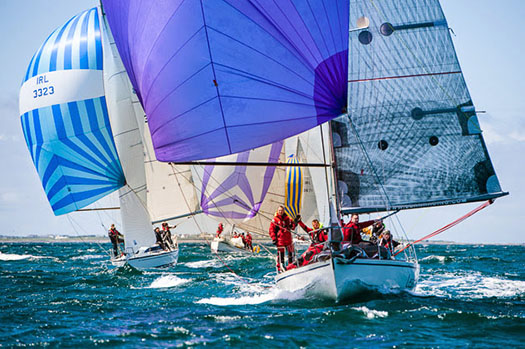
The images which came back from the ICRA Nationals 2013 in Tralee Bay suggested good sailing, but for two days the stormy weather caused a complete shut-down. Photo: Bob Bateman
When one cornerstone is removed, others are examined in more detail. The 2013 ICRA Nationals in Tralee Bay had the misfortune to coincide with a period of very unsettled weather which emphasised the fact that many of the top boats had travelled a long way by both sea and land to this gallant outpost of the Irish offshore racing scene to link up with their WIORA counterparts. But although some spectacularly sunny photos of racing in strong winds and bright sunshine emerged, the reality is that they barely had two days of viable competition as the rest of the programme was blown out in utterly miserable storm conditions.
Coming as it did at a time when the economy was barely faltering back into life, this unlucky outcome led to it being open season for suggestions as to the way ahead. There were those who wondered if people's seemingly ever-decreasing sailing time might be better used if the ICRA Nationals were combined into some established events, pointing out that a natural annual rhythm was already there with the biennial Volvo Cork Week rotating with the biennial Volvo Dun Laoghaire Regatta to provide easy access for large local fleets.
When set against the all-Ireland idealism of the founders, this was anathema to many, as the stand-alone national event, with the effort made to go anywhere in Ireland where you could find substantial local cruiser-racer fleets, was seen by some as central to the ICRA ethos.
However, things were put on hold during 2014 with a well-supported if locally-emphasised ICRA Nationals hosted by the Royal Irish YC in Dublin Bay in June, and then in July there was a mighty victory in the Commodore's Cup 2014 in a wonderful effort built around quiet background work by team captain Anthony O'Leary.
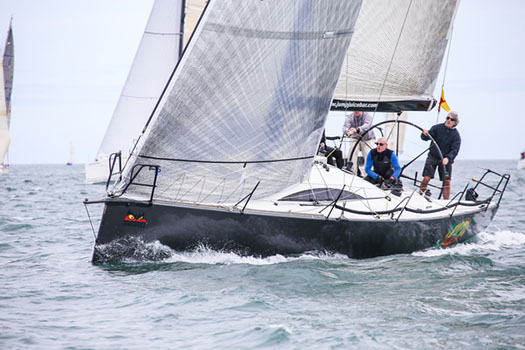
ICRA Nats 2014 in Dublin Bay saw a popular win in Class 0 for the Phelan family's Ker 36 Jump Juice from Crosshaven. Photo: David O'Brien
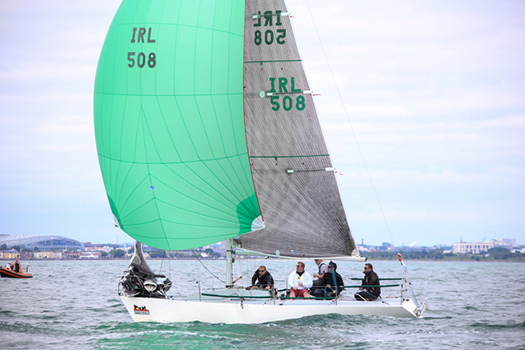
Jonathan Skerritt's vintage Quarter Tonner Quest of the host club was overall winner of the ICRA Nats 2014 at the RIYC. Photo: David O'Brien
But meanwhile, faced with the reality of the recession in sailing, ICRA's senior number cruncher Denis Kiely had quietly been putting out feelers about the possibility of combining the 2015 ICRA Nationals with Kinsale YC's biennial Sovereigns Cup regatta, which has been trundling along since 1995. By the time the great 2014 season was fully under way, it was no secret that this arrangement for 2015 was already in place, thereby guaranteeing – it was hoped – a substantial increase in numbers in 2015 and better overall value for the sailing community, while at the same time taking the ICRA Nationals to another new venue.
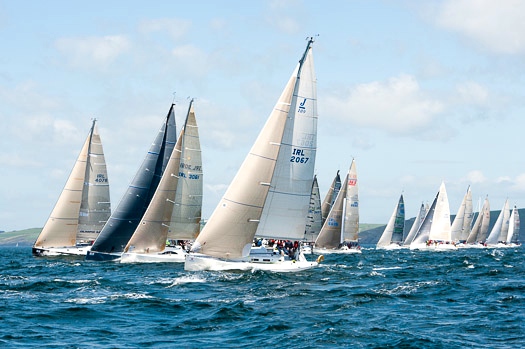
The perfect sailing in the 2013 Sovereign's Cup at Kinsale inspired ICRA officers to seek the link-up for the ICRA Nationals 2015 with the Sovereigns Cup 2015. Photo: Bob Bateman
At first glance, it seemed eminently sensible. But not everyone agreed. It was towards the end of an engaging interview with Commodore's Cup winner Anthony O'Leary at the end of July last summer in his beloved Royal Cork YC, just four days after he and his team had received the trophy on behalf of Ireland on the Royal Yacht Squadron lawns in Cowes, that I witnessed the first significant shot going across the bows of the good ship ICRA/Sovereigns of Kinsale.
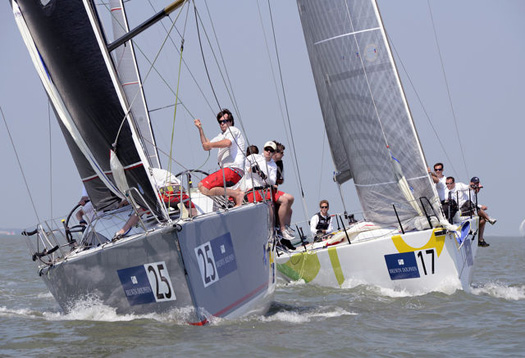
Team Captain Anthony O'Leary's veteran Ker 39 Antix hanging in there to stay ahead of a newer Ker 40 to lead Ireland to victory in the 2014 Commodore's Cup. Photo: Rick Tomlinson
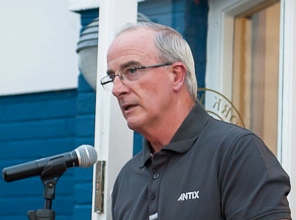
Someone whose considered opinion has to be taken seriously – Anthony O'Leary in thoughtful mood as he speaks at a reception to welcome the Commodore's Cup back to the Royal Cork YC. Photo: Bob Bateman
Anthony O'Leary was quite clear in his mind as to how the Irish cruiser-racing scene should go forward. And just as you should never get into a row with people who buy ink by the barrel, equally you wouldn't dream of openly disagreeing with someone who has just pulled Irish sailing out of the doldrums, so I just sat still and let this broadside roll over me.
"I think it's a mistake to incorporate the ICRA Nationals in the Sovereigns Cup in Kinsale....." he said bluntly. "The Sovereigns is one of my favourite regattas, but it's a friendly intimate business. While the town may have the infrastructure ashore, the marina is always crowded and I don't see how the kind of fleet they hope to attract will be comfortably accommodated there".
"Then too" he continued, "we already have two major alternating four day regattas in Dun Laoghaire and Cork Harbour. It's time to accept that sailing people are seeking to focus on fewer major events, and to give a more compact annual programme their best shot. So let's see how it would work if the ICRA Nationals simply rotated between Volvo Cork Week and the Volvo Dun Laoghaire Regatta".
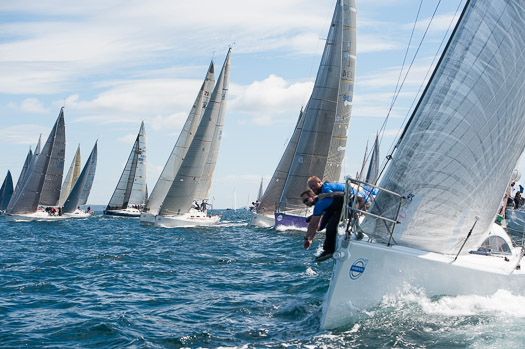
Clean close racing at Volvo Cork Week 2014. There's a line of thought that reckons this regatta could comfortably incorporate the ICRA Nationals. Photo: Bob Bateman
You can see how, in the circumstances, this idea seemed vibrant and immediately attractive. But more recently in an interview with another equally renowned sailor, Tim Goodbody who is Chairman of the Volvo Dun Laoghaire Regatta Committee 2015 there was something said which gave further pause for thought.
Tim Goodbody was totally clear in his own mind about the thinking behind the successful VDLR concept and its ability to provide viable racing for 31 different classes, and as he has helmed to victory both inshore and offshore to the highest levels, while also proving himself a master at designing courses for Dublin Bay, his views carry every bit as much weight as those of Anthony O'Leary.
"You have to remember it's a regatta, not a championship" said Goodbody. "Enjoyment of sport comes first, and the purity of fierce competition second. But of course we're going to provide the best possible starts. And the intention is to have those starts leading into the best possible courses in the conditions prevailing"
"Yet the way we see it, people should be racing just as soon as possible after leaving the harbour. There's nothing which impairs simple sailing enjoyment so much as having to wait around in a perfectly good but maybe fickle sailing breeze, hanging about in frustration while an overly-pernickety Race Officer dithers over setting the absolutely perfect start line".
In the context of the fun-filled suburban sailfest which is the VDLR, that's a perfectly reasonable approach. But is it a proper approach for something which aspires to call itself a National Championship? I rather doubt it, and there's no way the VDLR claims to be a national championship even if the numerous GP 14 Class are calling their enthusiastic participation in the VDLR 2015 the class's "Leinster Championship".
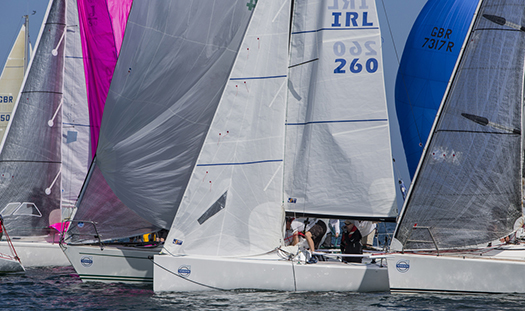
Everyone getting in everyone else's way, but that's part of the fun. The laid-back approach of the Volvo Dun Laoghaire Regatta as seen at 2013's event. Photo VDLR
For, in terms of boat size, the GP 14s will be among the smaller craft taking part in the VDLR, and they can find their own space. However, if you were campaigning a large cruiser-racer in one of the ten IRC classes which have to share the waters of Dublin Bay with 21 other boat classes during VDLR, would you expect to have your part of the event designated as the ICRA Nationals? On the contrary, if you were seriously concerned about the overall good of Irish sailing, you'd probably rightly think this was a spurious claim for what is essentially a fun event.
We were still mulling over the deeper meaning of Tim Goodbody's words in relation to Anthony O'Leary's opinions when this week another big beast in the sailing sphere, Minister for the Marine Simon Coveney no less, also launched into the choppy waters to be met with by those who would hope to rationalise the sailing programme into fewer but bigger international-standard events.
As he was speaking aboard the Naval Service's LE Eithne in Dublin's River Liffey at a reception to boost this summer's joint ICRA Nationals/Sovereigns event in Kinsale, it will be no surprise to learn that he was strongly in favour of it, so perhaps he reckons – unlike Anthony O'Leary - that Kinsale can cope with a substantial influx of visiting boats.
"Two events like this combined at the same time in one venue give extra strength" he said. "I want to see sailing in Ireland become much more ambitious in combining resources to create events which will have true international standing. This is a sport we should be really good at, both in participation and in staging events of world stature. Combining medium-sized events and regattas into one much bigger event like this one in Kinsale is going to be for the long-term good of Irish sailing in particular, and Ireland in general. The planned event is now expected to generate at least €800,000 extra income for the Kinsale area during the regatta period, while there's continuing beneficial spinoff for this harbour town which has added significance as the southern terminal and start point for the Wild Atlantic Way".
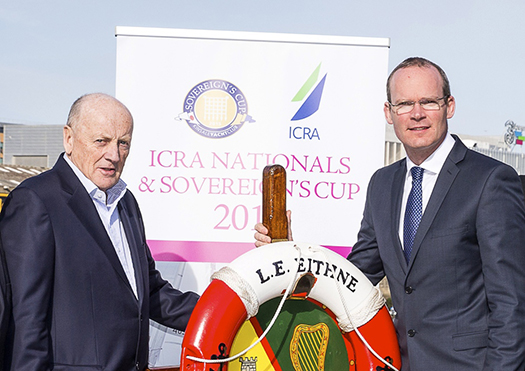
Norbert Reilly, Commodore of ICRA, with Minister for the Marine Simon Coveney at this week's reception aboard LE Eithne in Dublin to promote the combined ICRA Nats and Sovereigns Cup 2015 at Kinsale from 24th to 27th June. Photo: David Branigan
Doubtless we'll be getting spinoff of a different kind about these Ministerial views from the many people around the coast who work long and hard to keep alive those quirky little local regattas and special neighbourhood sailing and boating events which will never be major happenings of international stature, but are an essential part of the fabric of our many and varied maritime communities, and are deeply attractive for discerning visitor who shun crowds and seek out quiet enjoyment.
But as it is, aboard the Eithne we had yet another viewpoint to put into the cauldron of developing opinion, as the concluding speech was made by Nobby Reilly, current Commodore of ICRA. In a conversation with him before he made his speech, Nobby emphasised that the ICRA Nationals 2016 will be a stand-alone event once more, and he can be fairly certain about that, as the venue will be his own home port of Howth.
In the light of this, it should be remembered that in his blunt no-nonsense way, Nobby has done great work in encouraging newcomers into sailing. Earlier this week, I happened to be with some keen sailing folk from Wicklow including David Ryan – Farmer Ryan - whose remarkable Monster Project campaign of racing a Volvo 70 in Wicklow's Round Ireland Race 2014 had drawn on the efforts of Nobby Reilly and ICRA with their Let's Try Sailing campaign last May. This resulted in four wannabe sailors from remote parts of Ireland getting their first taste of the heavy metal with the Monster, and we'll see a film of it on RTE and other channels in due course, after the heroic task of cutting 147 hours of tape down to one hour has been completed.
But in the meantime, Nobby concluded the shipboard reception for this year's ICRA Nationals-with-the-Sovereigns-in-Kinsale with a spot of unexpected banter. "Maybe" says he, "maybe we should stop being concerned about trying to convince people that sailing is inexpensive. For we all know that, as it's a vehicle sport, there's bound to be basic expenditure over and above what you'd get with straightforward athletics and team sports. So maybe we should encourage people to get their kids to take up sailing on the grounds that if they come to like it, then there's no way they'll have the money to do drugs....."
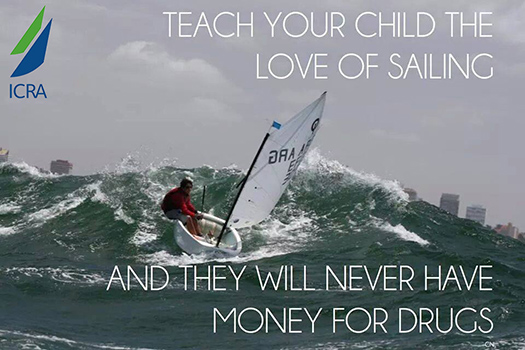
ICRA Commodore Nobby Reilly's positive response to the perceived costliness of sailing
Read also:
Should Irish Cruiser Racing (ICRA) Championships Stand Alone? (July 2013)
The Commodores' Cup – How Ireland Won It & Where It Might Go From Here (August 2014)
Youth Sailing Champions Are Saluted at Royal Cork Yacht Club
#youthsailing – Sunday turned out to be a miserable morning with winds gusting 30 knots at Roches Point and resulted in Principal Race Officer Peter Crowley cancelling all racing for the four youth sailing Classes writes Claire Bateman. Consequently, prize giving for these fleets was moved forward to 1.30 pm and facilitated an early journey home for the competitors.
In the Topper Class Geoff Power of Waterford Harbour Sailing Club took first place with a four point lead, while Luke McElwaine of Newcastle Yacht Club/Carlingford Lough Yacht Club came in second, only one point ahead of Tom Keal of Royal Cork Yacht Club in third place. First female Topper sailor was Caoimhe Foster of the host club, who came in fourth overall, only one point behind third place. The Toppers only managed four races over all in the event due to adverse weather. These results will be part of the basis for choice to compete for the Topper Summer Squad and the final decision on the full squad will be made in the coming weeks.
In the Laser 4.7 class the winning sailor was Henry Higgins of Royal St George Yacht Club and overall second placed sailor and winning female sailor was Rebecca O'Shaughnessey of Royal Cork Yacht Club with third place going to Conor Quinn of Carlingford Lough Yacht Club. This is an indicator event for the 4.7 ISA squad for the summer, along with other event results.
The performance of the Laser Radial girls at this event has to be noted, with five girls in the top ten and Erica Ruigrok of Rush Sailing Club coming in at third place, also giving her the first female result. Conor O'Beirne gave the most consistent performance over the nine races and gained first place. Second place went to Cian Byrne of Royal Cork Yacht Club who showed good local knowledge of winds and tides and used them to his advantage.
There was an extremely tight battle for first place in the 420s between Douglas Elmes and Colin O'Sullivan, of Royal Cork Yacht Club and Howth Yacht Club, and Peter McCann and Harry Whitaker, also Royal Cork, who took the overall prize. James McCann also Royal Cork, with Bill Staunton of Skerries Yacht Club as crew, was hot on the tail of his elder brother throughout the event and finished in third place. Lizzy McDowell and Anna O'Regan of Malahide Yacht Club were not far behind and took fourth place and first female position.
Meanwhile the wind had abated and shifted to the North and enabled racing to commence for the hardy optimists and this was particularly important in that places were up for grabs for the Worlds Team, the European Team and a Development Squad. Two races were sailed giving them a total of thirteen races over the event.
Top scoring Optimist in the Trials was Micháel Ó Suilleabháin KYC followed by Harry Bell of HYC second, followed by Gemma McDowell of MYC in third place.
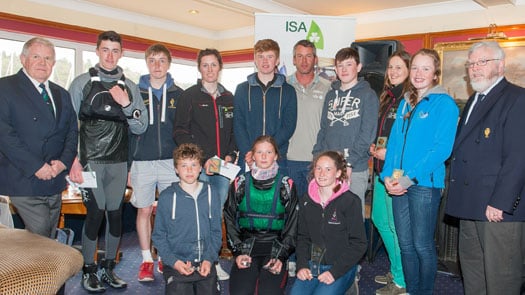
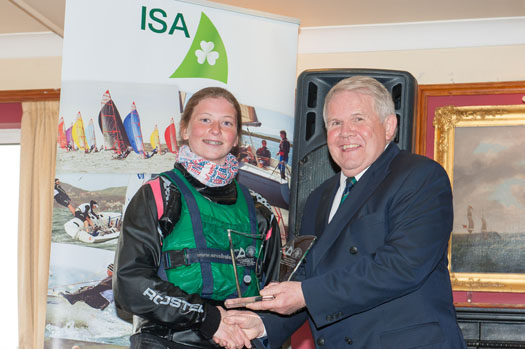
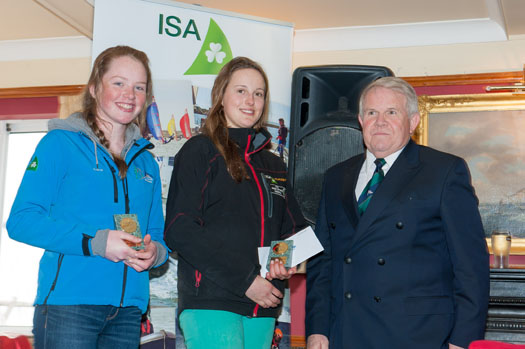
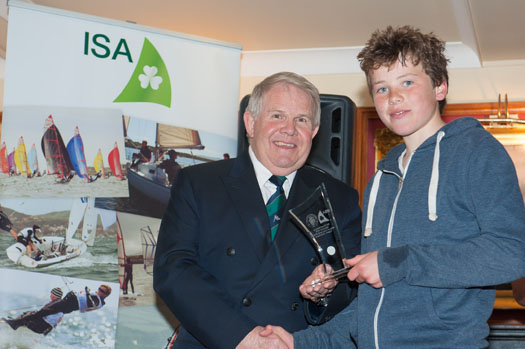
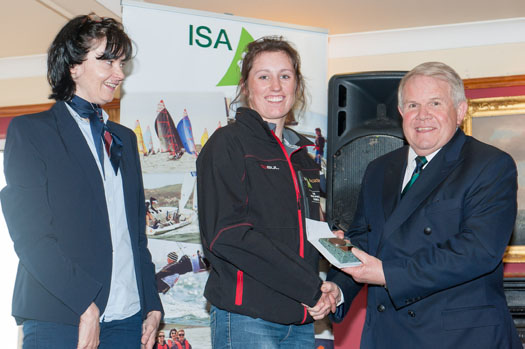
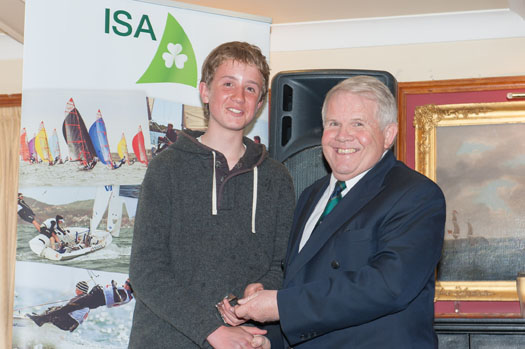
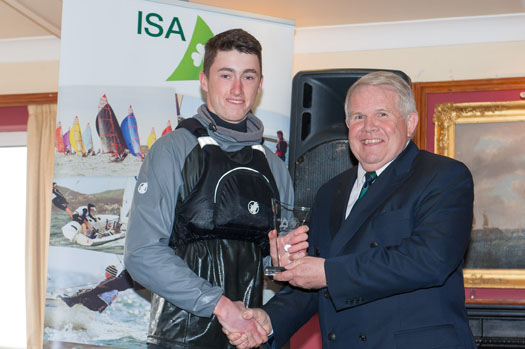
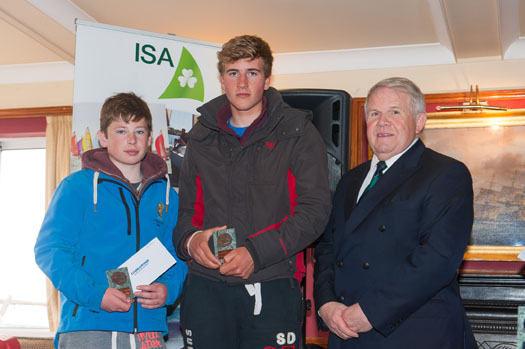
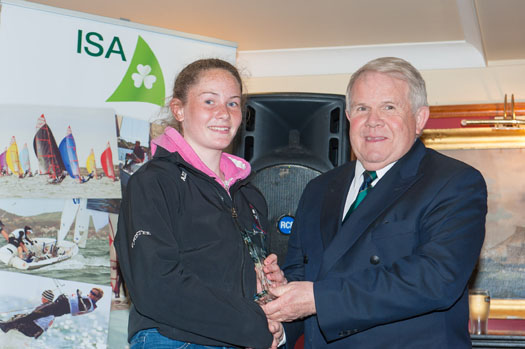
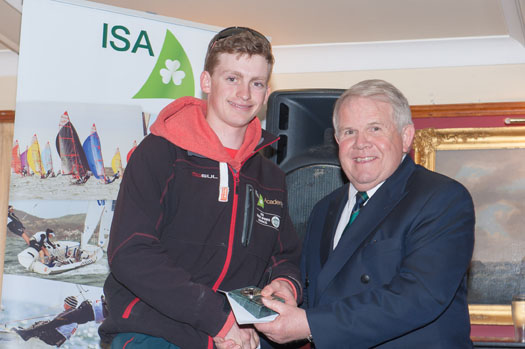
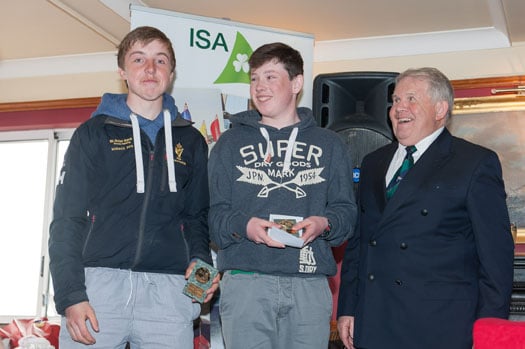
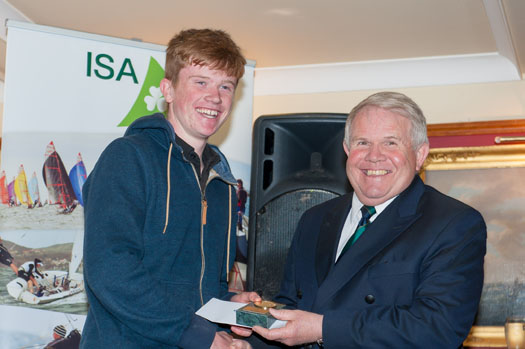
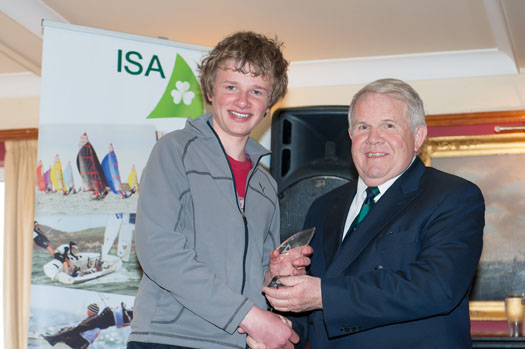
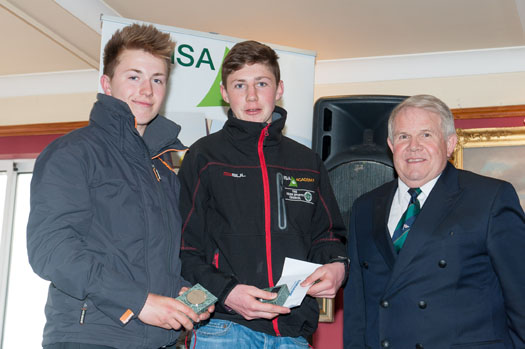
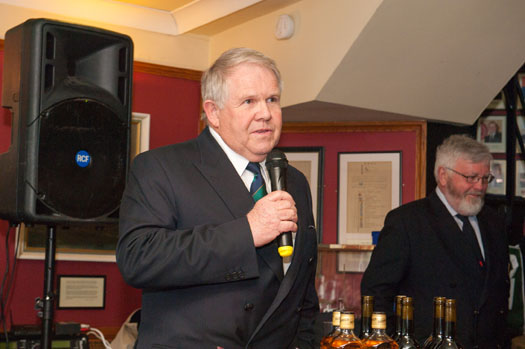
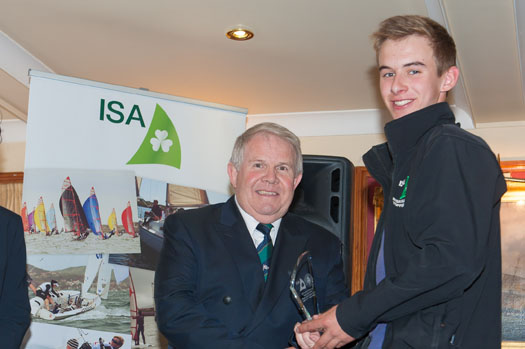
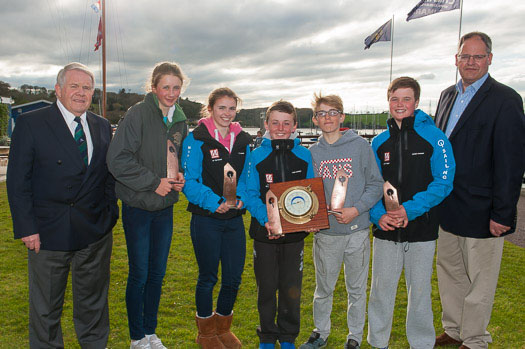
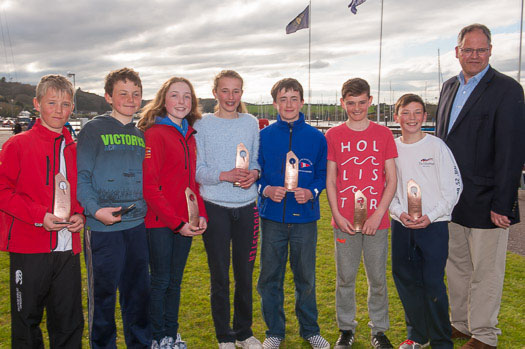
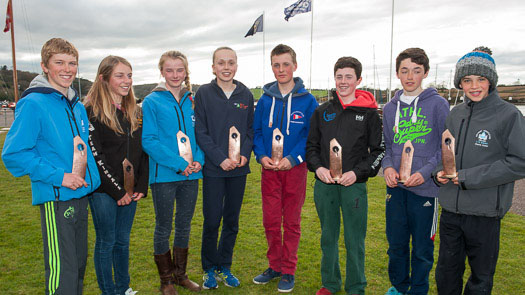
#youthsailing – The Youth Sailing Nationals for Topper, 420, Laser 4.7 and Laser Radial will be hosted by Royal Cork Yacht Club from tomorrow, Thursday 9th to Sunday 12th April 2015. This is an open event for all sailors in these classes writes Claire Bateman.
Today at the RCYC the air was filled with excited chatter and greeting of friends arriving from all over Ireland. Conditions were ideal with bright sunshine and sailors quickly got down to the last minute preparations and checking of their gear. The Optimists were weighed and they had their sails stamped.
The ISA Youth Pathway Nationals will be the selection trials (or part of) for National squads and an indicator (amongst other events) for the Academy. Classes sailing will be 420, Laser Radial, Laser 4.7 and Topper. The IODAI 2015 Optimist Trials will be held in conjunction with, but sailed on a separate course from the Championships. There will not be an Optimist fleet in the ISA Youth National Championships 2015. Tomorrow Thursday the Laser Radials and 420s will commence racing. Tomorrow will also see the beginning of the Optimist four day IODAI Trials with Anthony O'Leary Afloat Sailor of the Year as Race Officer, and Friday will see the commencement of racing for the Topper and Laser 4.7 fleets.
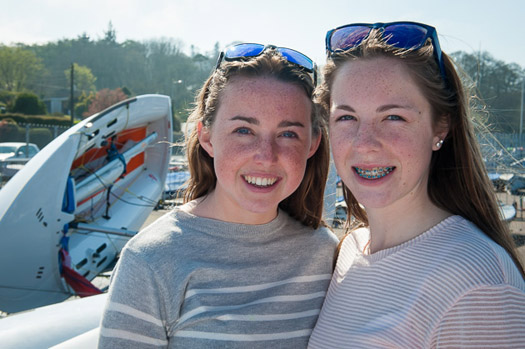
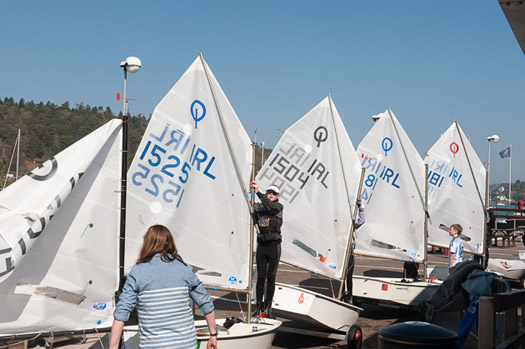
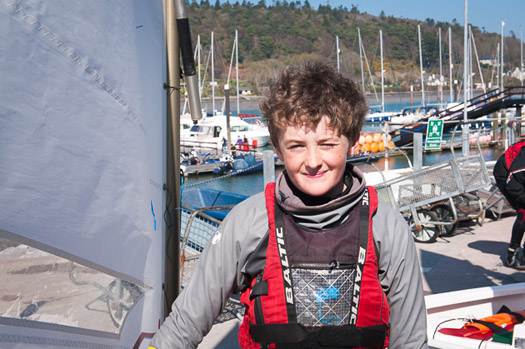
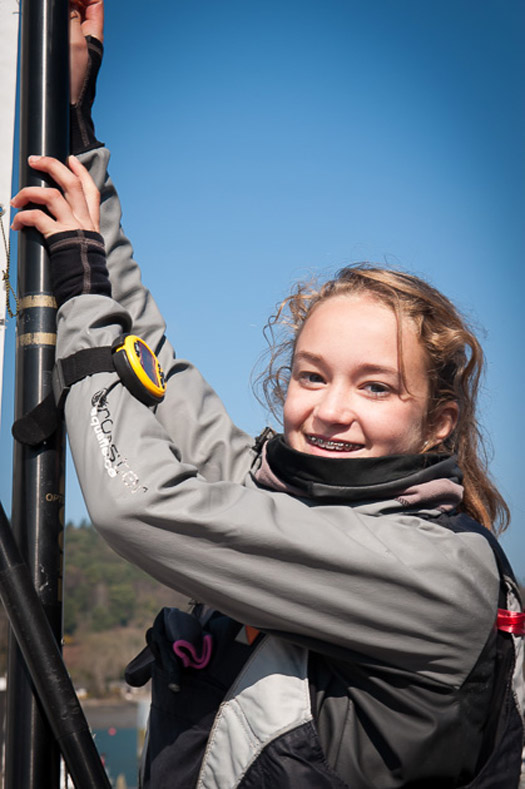
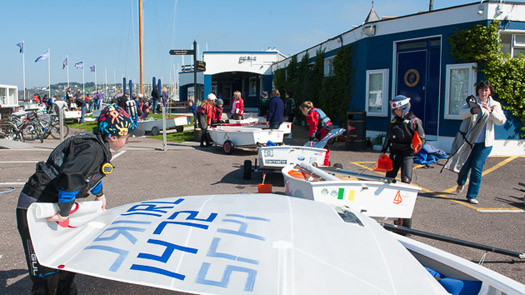
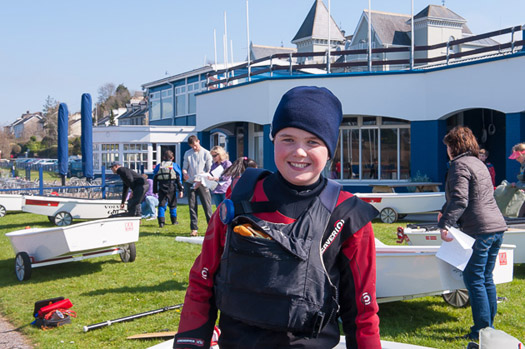
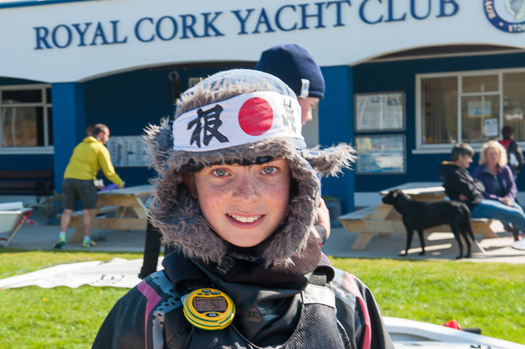
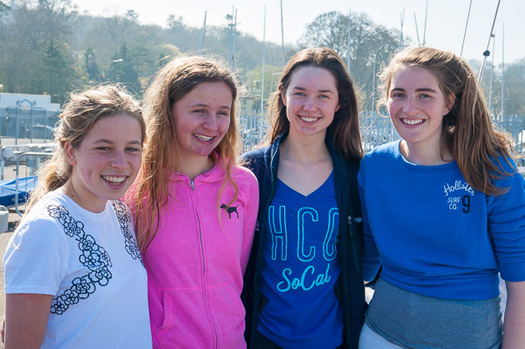
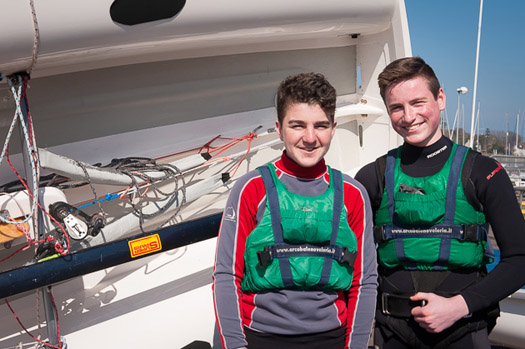
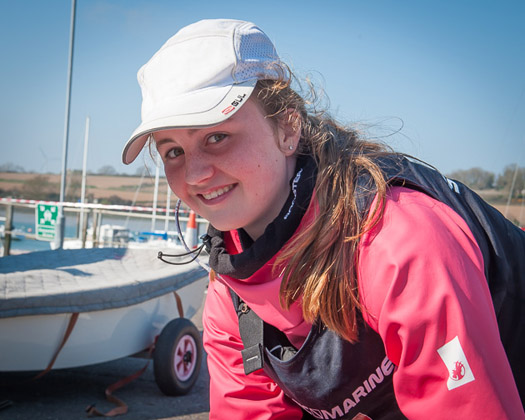
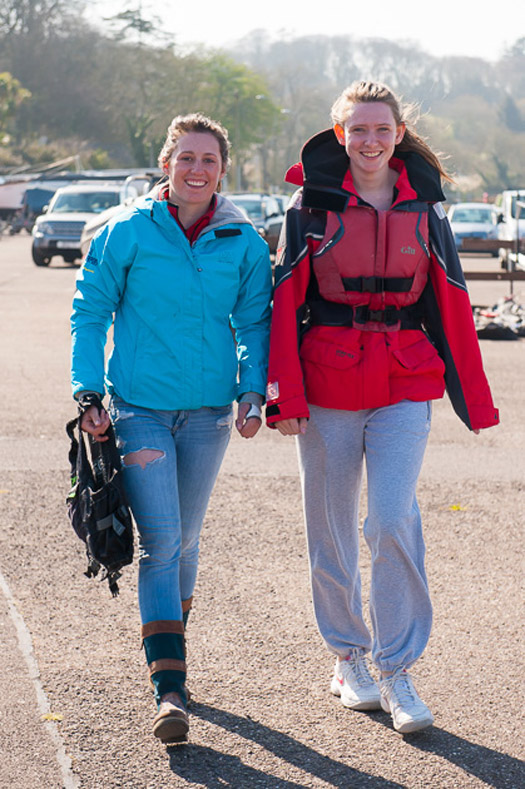
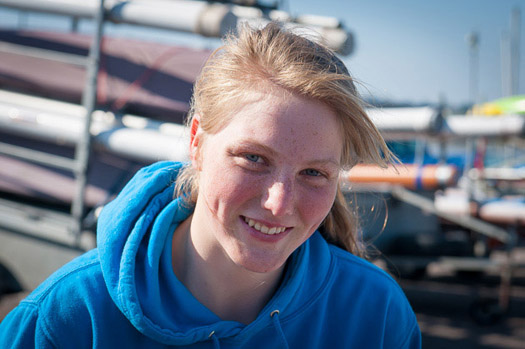
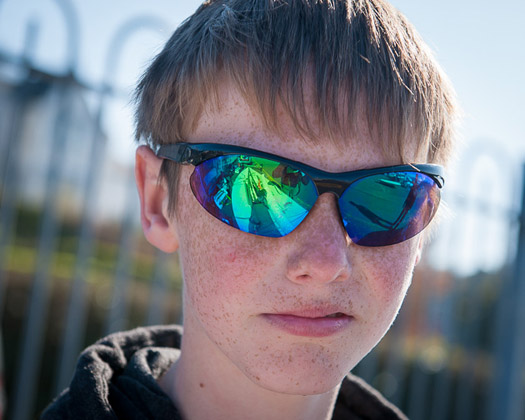
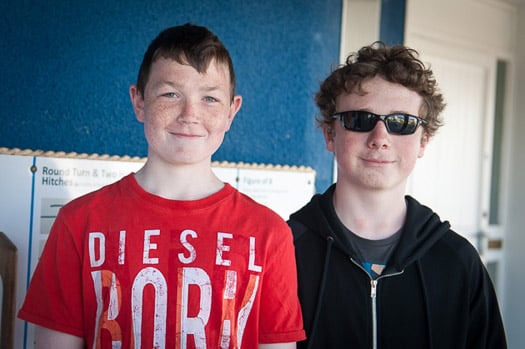
Laser Ace Séafra Guilfoyle wins Royal Cork PY 500
#py500 – Séafra Guilfoyle has won the Royal Cork Yacht Club's PY 500 dinghy prize this afternoon. Only 8 seconds separated 3 dinghy classes at the finish writes Claire Bateman.
Saturday March 14 was the due date for the second annual PY 500 race at the Royal Cork Yacht Club. Well, what a story. The morning dawned with a beautiful blue sky and wonderful reflections in the clear water but alas and alack not a hint of a breeze could be felt and Race Officer Nathan Kirwan had no option but to postpone racing. As the race was to be held in the river, it was hoped to have a start an hour before high water but it was not to be. 'Experts' scanned the skies and ascertained that what clouds were there were moving slightly from the east. And so, when the light fickle breeze did fill in at 11.45am a windward/leeward course was set starting from the club marina with instructions for all boats to sail three rounds.
With a prize fund of €500 for the lucky winner and the ebb tide starting to flow more strongly the competitors were somewhat over eager and a general recall was necessary for the first start but all boats got away cleanly on the second attempt. The race had attracted an excellent entry of 38 but with the light wind morning this was whittled down to 32, still an excellent number. There was a great variety of craft on the water heading for the first mark ranging from National 18's, RS 400's, Lasers full rig, Laser Radials and Lasers 4.7, Toppers, an International 14, a 29er, a Pico, a Laser Stratos, a Finn and a brave Mirror and they all rounded the first mark without any incidents. They completed three rounds of the course and great concentration was needed in the light wind sailing but it proved to be a very enjoyable event resulting in only minor shouting between the competitors
When the results were calculated using the Portsmouth Yardstick only eight seconds separated the first three boats and indeed only three seconds separated the first two boats. Séafre Guilfoyle in a Laser full rig was the popular winner followed by a National 18 sailed by Nicholas O'Leary crewed by Michael O'Brien and Alex O'Connell, in second place and David Kenefick crewed by Grattan Roberts in an RS400 third .
Given the tightness of the results, one wonders what would have been the final placings if the two leading National 18's hadn't decide to concentrate between themselves on having a luffing match approaching the leeward mark in round 2, and who can tell whether or not this was where the vital three seconds between first and second place was lost. Neither they nor we will ever know for sure!
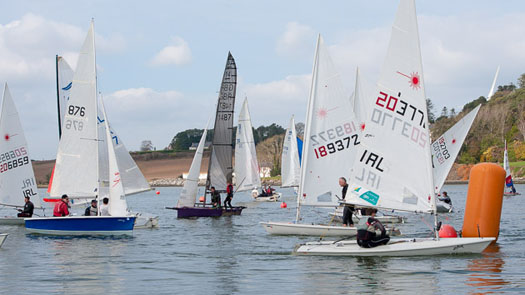
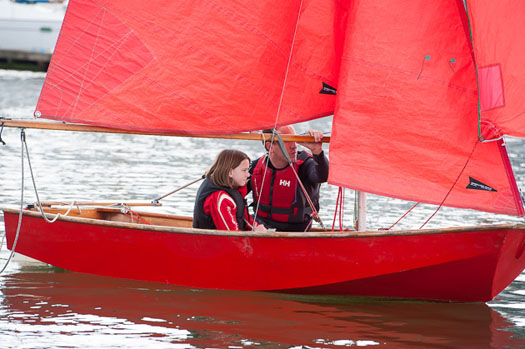
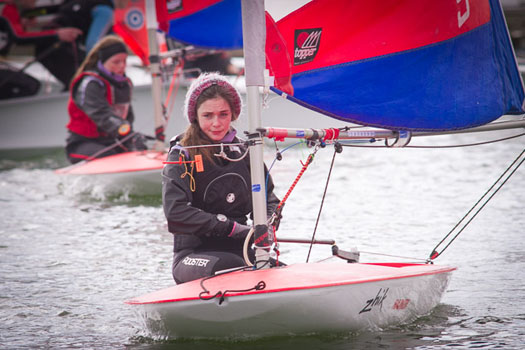
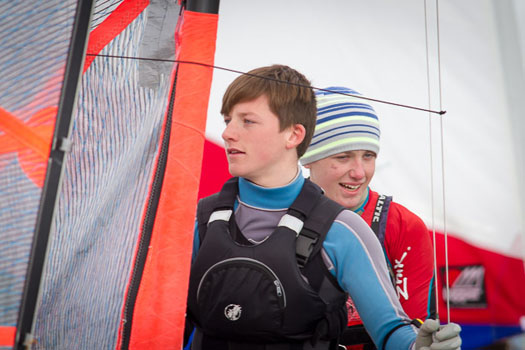
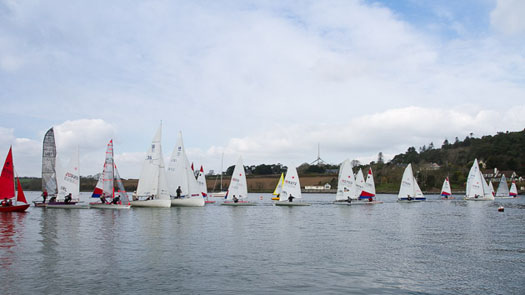
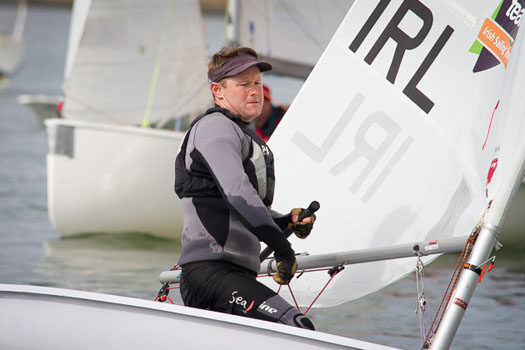
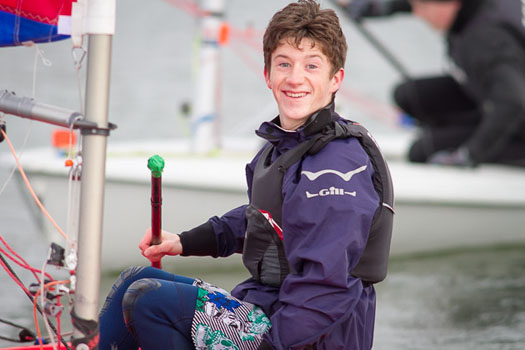
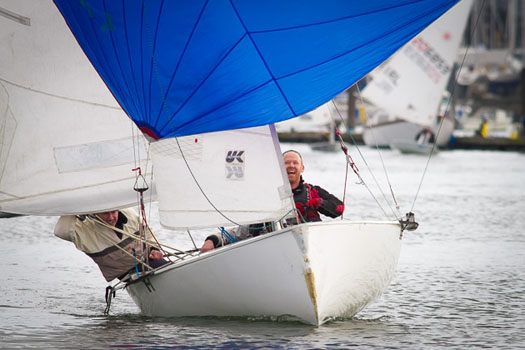
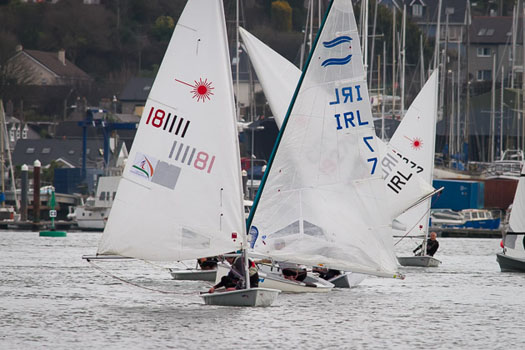
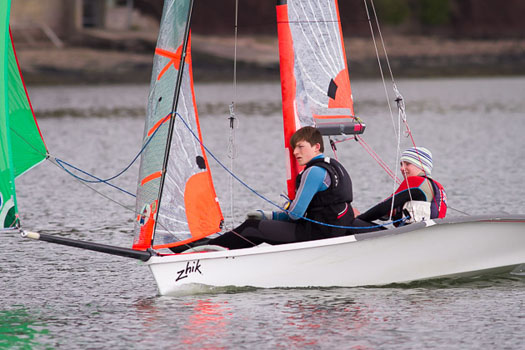
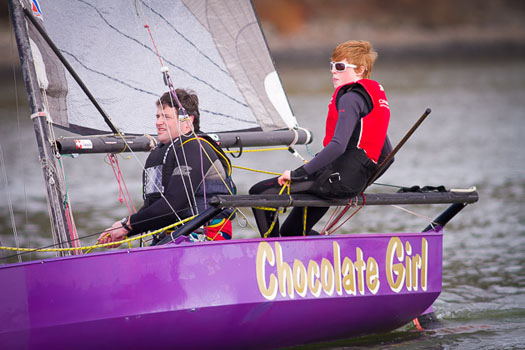
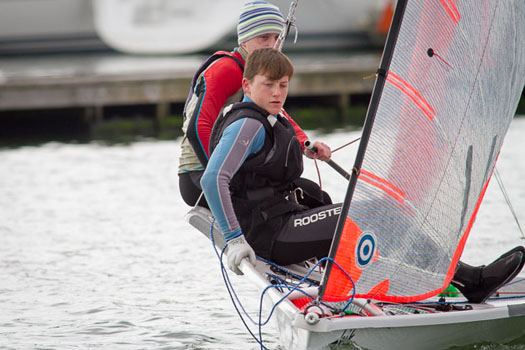
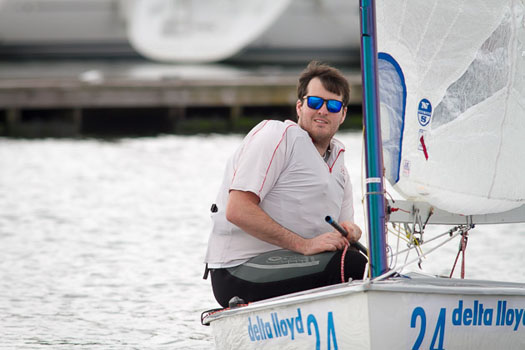
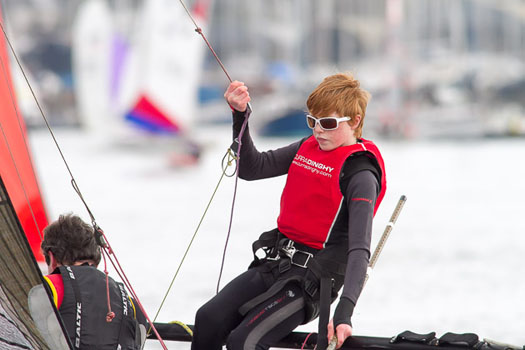
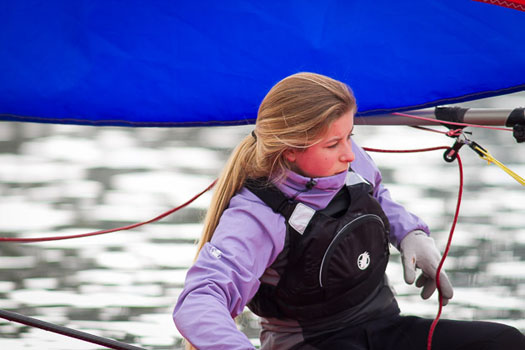
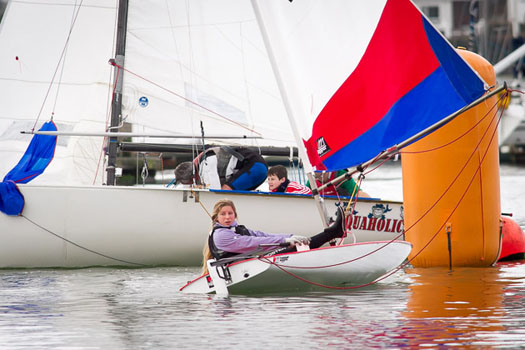
Cork Sailors Hear About New ISA Plan For Irish Sailing
#irishsailing – The Irish Sailing Association SRG (Strategic Review Committee) penultimate meeting of the series took place last evening at the Rochestown Park Hotel, Cork and drew an excellent attendance with a large number of representatives from southern clubs and sailing establishments in attendance and sailing instructors were also well represented. Claire Bateman reports.
The meeting was chaired by former RCYC Admiral David O'Brien, Dublin SRG representatives who travelled were Brian Craig and former ISA Presidents Neil Murphy and Roger Bannon, and Harry Hermon of the ISA.
A full copy of the ISA Strategic plan until 2020 can be found here.
The meeting commenced at 7pm with an introduction by David O'Brien followed by Neil Murphy who took the meeting through the Strategic Plan line by line. The attendance had been requested to hold questions until the presentation was complete and this request was duly complied with. The Q & A session began at approximately 8.50pm with the meeting scheduled to finish at 9pm. People had a lot of points to make and the meeting finally concluded at approximately 9.45pm.
It could have been a meeting from some twenty years ago and this was no bad thing. Some very old chestnuts were still being aired along with some new topics and indeed some views being expressed from the top table were still unchanged from former years. As one would expect from the wonderful cruising areas in the south west, cruising got a good airing from several quarters with changes being requested in recognition of the importance of this branch of sailing. Also, the importance of motor boating was raised with the rise in numbers of such craft now being seen and, indeed as pointed out by Vice Admiral John Roche of RCYC, there are now some thirty to forty such boats on the RCYC marina and other speakers pointed out this is reflected in clubs all around the country.
A thorny area drew huge response from the meeting and this was the situation regarding RYA courses. Currently RYA instructors are giving courses in this country and these instructors will in be working here and it was pointed out these courses are fully recognised outside Ireland while the ISA Instructor courses have no such recognition. The question of frequent compulsory revalidation also proved to be a hot topic and one that the Instructors have requested to be looked at. The lack of availability of qualified instructors also came up for discussion. The ISA Pathway also came up for discussion and is another area to be looked at.
The ISA's view on the question of promoting two person boats over single handed dinghies, desirable and all as the idea may be to some people, came into sharp focus in a week where a sell out mid term sail training week for Optimists in Baltimore SC is being attended by 150 Optimist sailors and their families from all corners of Ireland. Indeed, your scribe, residing near the main route to West Cork, could describe the numbers of vehicles travelling west complete with packed roof boxes and trailers piled high with all the gear while the car interiors showed parents, youngsters and in a lot of cases family mutts, all heading to a week of hard training for the enthusiasts and a fun week for the younger family members and hopefully for the parents and indeed for the village of Baltimore. By all accounts this is exactly what is taking place.
There was a view put forward from the top table that an Optimist sailor coming out of the ranks when it was time to move on would have no knowledge of sailing coming out of a "little box of a boat". Here I have to disagree strongly. Now, I am no great Optimist fan but I have watched these sailors and their knowledge of sailing can be quite fantastic and their experience of different sails in knowing what is needed for different weights and conditions is absolutely tremendous. They go to sea in conditions that leave the rest of the fleets high and dry and enjoy themselves experiencing conditions the experienced hardy annuals would baulk at. Pay a visit to the Royal Cork Yacht Club during any school holidays and you will find the Oppie Skippers sailing anything and everything they can get their hands on. They will go out in Topaz, 420's, Fevas, International 14's, Toppers, you name it and they will be found.
They also join the club racing/cruising fleets as crew and can be found doing on board crew tasks on the these boats and will also helm. Where did Sir Ben Ainslie commence his sailing career? In an Optimist of course. Last word on this, on one occasion when the ISA were really pushing two person boats, one in particular, the parents responded by deciding to buy Laser 2's in large numbers against the recommendation of the ISA. A world championship for these boats was held in Crosshaven with large numbers in attendance. Where are they now?
The appreciation for the hard work of the SRG Committee was expressed by all and the members thanked for coming to Cork. The last meeting of the series will be held in Galway and the final item on the SRG agenda for the moment will be to try to ensure the adoption of the SRG Plan. If sailors have strong views to express they should make the effort to be present at the Maldron Hotel, Portlaoise at 11.30am on March 28th. If you are not there you cannot complain afterwards if an item was passed you did not agree with without at least having the chance to express your opinion.
A good humoured meeting at the Rochestown Park Hotel in Cork and devoid of any real controversy.
Just Who Do The Irish Sailing Association Think They Are?
#irishsailing – Ireland's national sailing authority has been going through turbulent times in recent years. With unprecedented expansion of ISA staff numbers as the country revelled in the boom years of the Celtic Tiger, the arrival of the inevitable and abrupt financial downturn found an Association bloated, unfit to cope, and out of touch with ordinary sailors.
High profile events, top level training and international participation had become so dominant in the ISA's range of activities that many of the ordinary sailors of Ireland already felt the Association was no longer relevant to their own low key personal pursuit of friendly sport afloat.
When the crash came, it led to a marked decrease in active sailing numbers as disposable incomes fell away. People focused on keeping their jobs and businesses afloat rather than their boats sailing, while many promising young sailors were forced to emigrate.
This new reality was reflected by the growing disillusion of club officers, who saw their membership subscriptions decreasing even while the ISA – which is largely reliant on subvention from the clubs for its own income – seemed always to be looking for more money. And at the height of the boom years, when all the major clubs had put through significant expenditure in developing their facilities to international standards, the ISA had shown its lack of contact with the reality of club life by proposing its own stand-alone National Sailing Centre in Galway, a facility which would in effect have been run in rivalry to the main clubs. To the mutterings in the grass roots were added the rumblings from above as major clubs threatened to withhold their annual payment to the ISA unless real reform was initiated. W M Nixon takes up the story.
In a classic grass roots revolution, club sailors Norman Lee from Greystones in County Wicklow and Bryan Armstrong from Sligo were at first rebuffed when they tried to voice their concerns about the ISA's increasing irrelevance to the needs of the vast majority of sailing enthusiasts, people at local level who were doing their very best to keep the sport alive through torrid times.
The Irish sailing community now owes these two men and their supporters a debt of gratitude, for they believed in what they were saying and they refused to be turned aside. Eventually, in November 2013 moves were in place to establish a Review Group for the urgent analysis of all ISA activities, and its personnel drew comprehensively on Ireland's remarkable pool of people with hands-on experience of running successful sailing events and organisations.
It was chaired by Brian Craig of Dun Laoghaire who has headed up the organising team on more major and notably successful international sailing events in Dublin Bay than probably anyone else, and its able personnel included two former ISA Presidents - Roger Bannon of Dun Laoghaire and Neil Murphy of Malahide and Howth - who had both been noted for their skill in running a tight ship when they were in charge. With them was highly regarded International Race Officer Jack Roy of Dun Laoghaire, and renowned sailmaker/activist Des McWilliam of Crosshaven, who each year is inevitably seen in busy involvement afloat in more Irish sailing centres - large and small - than anyone else in the boat world.
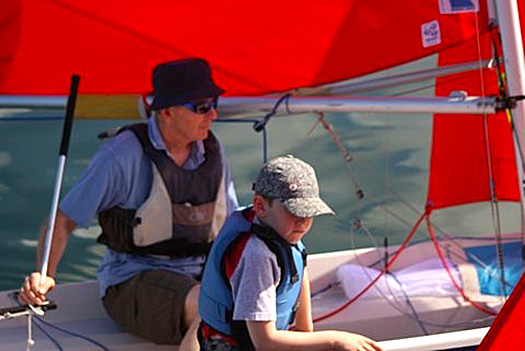
Bryan Amstrong of Sligo on the helm for a Mirror race
Also on board was one of the men from the barricades, Bryan Armstrong of Sligo. His background in a relatively remotely-located club which nevertheless has a long and distinguished sailing history made him uniquely qualified to voice the concerns of the grass roots. And we have to remember that all these people were giving voluntarily and generously of their time to this project in a period when Irish life was largely a matter of just getting through each day, while staying economically afloat was something of an achievement.
Primarily, the Review Group's function was to analyse the Association work on behalf of ordinary club sailors, as it was agreed that the Olympic and High Performance Divisions of the ISA's activities – which receive direct Sports Council grants – were in effect functioning as a different entity.
The Strategic Review Group was still work in progress when the ISA acquired a new President in David Lovegrove in March 2014, but by August the SRG published proposals which led to the setting up of a more formal body, the Planning Group. If this seems like a case of kicking the can down the road, it was anything but - these were people in a hurry, they'd got through the first stage of analysing areas where action was required, now they had to be more structured in coming up with clearcut ideas and concrete proposals.
This new Planning Group, which went into action in early Autumn 2014, was chaired by Neil Murphy, and its members included ISA President David Lovegrove, ISA Board Member Brian Craig, Ruth Ennis, Peter Redden, Sean Craig, and ISA CEO Harry Hermon, with noted Dun Laoghaire events administrator Ciara Dowling to provide administrative support.
They had their draft plan ready by mid-December 2014, and on January 21st 2015 Neil Murphy and his group publicly unveiled their analysis and proposals for the first time at a well-attended and very representative meeting in the Royal St George YC in Dun Laoghaire.
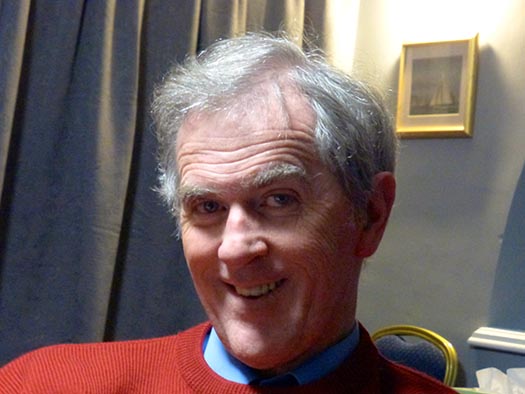 Neil Murphy is a former ISA President who, in addition to extensive experience as a Race Officer, is a typical club sailor, racing a Puppeteer 22 out of Howth. Photo: W M Nixon
Neil Murphy is a former ISA President who, in addition to extensive experience as a Race Officer, is a typical club sailor, racing a Puppeteer 22 out of Howth. Photo: W M Nixon
While those involved in setting the ISA on a healthier course are mostly working on a voluntary basis, it has to be said that the PowerPoint presentation and the printed material was of the highest professional class. In fact, it was much better than many professional shows I've been to, and the level of thought which went into a wide range of questions from the floor answered by Neil Murphy, Brian Craig and David Lovegrove generated a growing level of goodwill which concluded with Norman Lee voicing his congratulations and good wishes for this continuing process in which he and Bryan Armstrong had played such a key role.
So now we move on to the next stage – taking the ideas to the rest of the country. Doubtless you'll have noted the double meaning in titling this piece 'Just Who Do The ISA Think They Are?' In a first interpretation, that question is the one for which, let's hope, we are all now involved in working together in providing and implementing a satisfactory answer.
But equally, as the ISA Road Show gets out of Dublin to take this excellent presentation to a public meeting in Cork next week (it's in the Rochestown Park Hotel on Tuesday, Feb 17th, 7.0 pm to 9.0 pm) and then Galway the week after (Galway Bay Sailing Club, Tuesday 24th February 7.0 pm to 9.0pm), they'll be taking themselves into areas where experience of sailing administration long pre-dates the establishment of organised sailing on Dublin Bay.
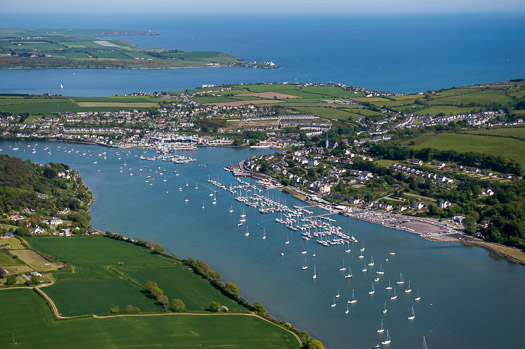 Crosshaven in the summer time. When we look at the natural advantages to be found here, it's little wonder that structured recreational sailing on Cork Harbour long-pre-dated any organised sport on Dublin Bay. Photo: Robert Bateman
Crosshaven in the summer time. When we look at the natural advantages to be found here, it's little wonder that structured recreational sailing on Cork Harbour long-pre-dated any organised sport on Dublin Bay. Photo: Robert Bateman
So you might well ask just just who do they think they are, these people from Dublin, going down to Cork to try to tell them how sailing should be organised? The nerve of them, doing it in a place where they've had organised sailing since 1720, and where the two biggest clubs – the Royal Cork and Kinsale – are both mighty establishments of international sailing repute which would remain so even were the ISA to disappear overnight in a puff of smoke...
And as for going west along the road to Galway, that will take them through Athlone where the Lough Ree Yacht Club dates back to 1770, while on the west coast the Royal Western of Ireland YC at Kilrush traces its origins back to 1828. Equally, further north along the Atlantic coast Sligo YC dates back to 1821, and in Lough Erne the club began in 1820. Yet the first club on Dublin Bay, the Royal Irish, only began as recently as 1831, and even then it barely hung in and had to be revived in 1846, with the pace being set in the meantime by the Royal St George YC, founded 1838.
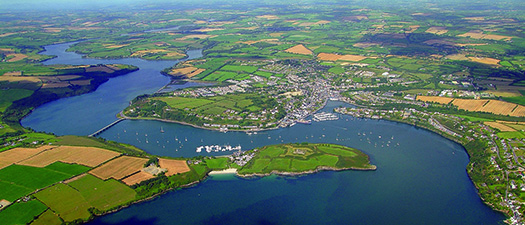
Kinsale is another harbour which seems to have been designed with sailing primarily in mind. Photo: Kevin Dwyer/courtesy ICC
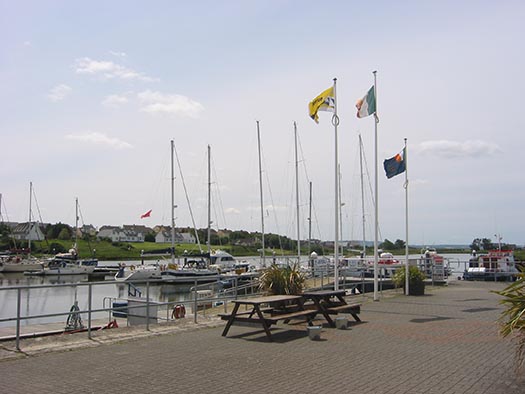
Kilrush on the Shannon Estuary had a club in being before there were any sailing institutions on Dublin Bay. Photo: W M Nixon
So in terms of sailing administration history, Dublin and Dun Laoghaire are only Johnny-come-lately places by comparison with just about everywhere else in Ireland. Yet thanks to the inevitable dominance of economic development, population growth and the strengthening centres of political power, we now find that sailing administration and decisions of national import are emanating from a place that, in terms of natural sailing advantages, lags far behind the rest of the country.
Oh for sure, Dun Laoghaire Harbour is a fabulous artificial amenity, and the advent of the new marina at Greystones has already been seized upon as greatly increasing the "cruising" options of Dublin Bay. But let's face it, Dublin Bay is really only good for racing, specific day sailing and training, whereas Cork Harbour and Kinsale provide such a variety of opportunities for interesting race courses, mini-cruises with multiple destinations and what have you, that in effect they're not just in a different part of the country – they're a different country altogether.

Dun Laoghaire is a totally artificial facility, and sailing options on Dublin Bay are limited. But it's inescapable that this is the primary point of leisure access to the sea for Ireland's largest and most affluent population. Photo: Kevin Dwyer/courtesy ICC
All of which adds to the difficulties of creating a meaningful national authority with which every sailing person can identify.
This business of Dublin v The Rest is not unique to sailing, of course, but when you have a specialist sport with multiple sub-branches of activity, the problem is exacerbated.
So please bear this in mind if you take yourself along to the meetings in Cork or Galway during the next ten days. This really is a genuine attempt to base the ISA within the sailing community at an everyday level of usefulness to all, with scope for growth while enhancing existing structures, and input from the sailing community at this stage will help in developing the ideas and initiatives proposed.
While the draft ISA Strategic Plan 2015-2020 very definitely puts the emphasis back on to the need for healthy well-run clubs as the basis for the sport, there was initially a feeling at the meeting on January 21st that the new-look ISA is not supportive of commercial sailing schools. In fact, what the new-look ISA hopes to do is encourage training schemes within clubs, while at the same time supporting commercial sailing schools where the demand is such that no club could realistically cope while maintaining its essential club ethos.
Going into this in more detail in a personal meeting this week with Neil Murphy, who is a Chartered Quantity Surveyor, we talked around the fact that a thriving club scene is central to the spirit of Irish sailing, and he was musing on the success of Sutton Dinghy Club where Hugh Gill heads up what is in effect a commercial sailing school within a club setting.
In fact, what Murphy would hope to see emerge at larger population centres is sailing's equivalent of the public golf course. Anyone who has used a public golf course will be aware that the proprietors are usually mustard keen to encourage the formation of a "club" within their customer base, and there is no reason why this shouldn't eventually take root in Irish sailing, providing access to sailing at a fraction of the cost of joining an established club.
It's not something which can realistically be objected to by established clubs trying to protect their own membership, as the people who would use a "public sailing club" would be those who simply couldn't afford to go sailing at all in the current traditional club setup.
Nevertheless support for the established club setup is central to the new Strategic Plan, and the provision of Regional Development Officers to serve clubs directly is very much to the fore in the new thinking. But in looking over the figures published with the report, it's good to note that the ISA works with no less than 80 recognised training centres, while an encouraging statistic is that there are now 24 secondary schools in Ireland which include sailing as a regular part of their curriculum. Admittedly it's a long way from the French setup where every schoolkid is entitled by law to one week of sailing and one week of skiing per year, but in a country where an aversion to being on the water used to be thought inevitable, it's a step in the right direction.
All these considerations of inexpensive sailing are a whole world away from the stories of recent weeks and days about the ISA's High Performance Division seeking a fund-raising executive who will be tasked with finding €2.75 million per annum through philanthropic and other donations in order to help the funding of top level campaigns which we're not allowed to call Olympic campaigns, as apparently that is copyrighted by the Olympic Council, so we call them High Performance instead.
But apparently Government departments aren't restricted by this limitation on the use of the word Olympic, for it was bandied about like nobody's business in this week's news that the government is spending mightily through the Sports Council, with sailing being number three in all Ireland in terms of current Sports Council funding, with a total tag of €1,289,900.
Of course it's not all for specifically Olympic sailing, but it covers 103 sailors from Optimists to the Olympics. Which is fine and dandy for those who are mad keen to race at the highest level, but most sailors in Ireland are much more interested in performing well within their chosen area and boat class, but with sailing being just part of a reasonably civilised and well-balanced life.
And as became evident at the meeting on January 21st, there's an increasing number of people who feel that sailing needs to realise that there's a sizeable population out there of folk who'd like to go sailing, but don't feel the almost religious vocation to own a boat.
With the rapid expansion of sunshine sailing holidays with boats and equipment readily available for hire at the destination, there's a strong feeling there's a real need for more of this in Ireland, even if we can't guarantee the sunshine. The suggestion brings us back to both the "public sailing club" concept, and the growing realisation by established clubs that they have to reach out to potential members by having boats available for sailing on a trial basis.
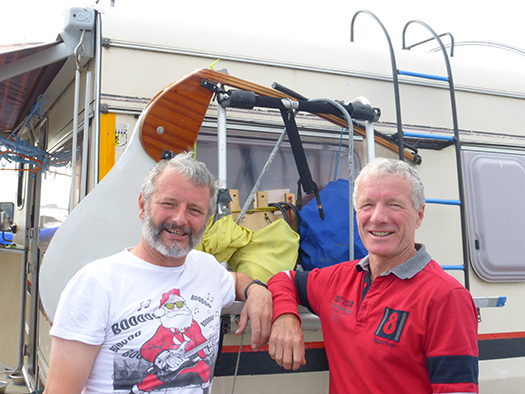
The Affordable Sailing Team – Norman Lee (right) with his brother Ken beside their campervan at last year's GP 14 Worlds at East Down YC on Strangford Lough. Photo: W M Nixon
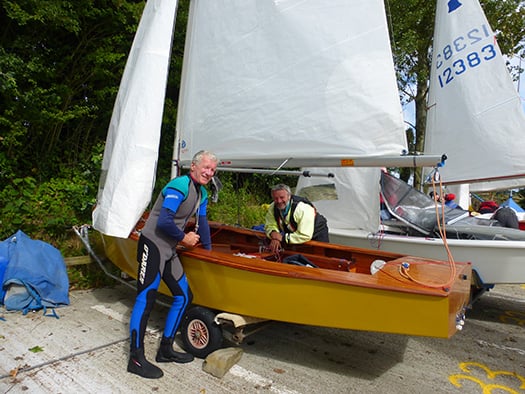
With their own very high can-do standards of boat maintenance, Norman and Ken Lee can keep their GP 14 in the competitive frame. Photo: W M Nixon
That said, the need to own one's own boat and tune and tinker with her to your heart's content is what sailing is all about for many of us, and Norman Lee is a classic case in point for this approach. He claims that his sailing costs him just €600 per year, though that of course is after he has paid for his well-tuned GP14, and he has long since written off the cost of the vintage camper-van which is home to the Lee Equipe when they hit the campaign trail.
Nevertheless the entire setup has to be outstandingly good value, and doing it in such economical style is part of the fun of it all. So when someone with Norman Lee's approach to sailing is prepared to get up at the big ISA public meeting in Dun Laoghaire and congratulate the team who have been working on the reforms which he and Bryan Armstrong set in train, then that is approval of a high order.
And as for just who or what is the ISA, can we maybe agree that ideally we all are the ISA, every last one of us who goes sailing or is even just interested in the sport, and it's up to us to keep it in line and encourage it to identify with and serve the ordinary sailor every bit as much as the high-flyer.
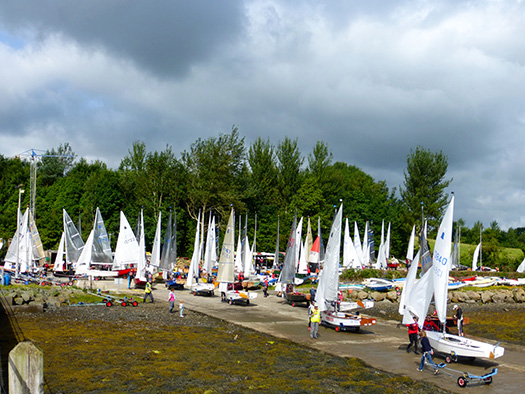
Private pleasure.....the 2014 GP 14 Worlds at East Down YC is about as high as many Irish sailors would expect or want to aim, and many are content with much lower-key regular club sailing. Photo: W M Nixon
Dinghy Fest 2015 – Royal Cork Yacht Club Launches Major Small Boat Racing Event for 2015
#dinghyfest2015 – The Royal Cork Yacht Club (RCYC) and more than seven Irish dinghy classes have launched a Cork Harbour Dinghy racing fesival for 2015. As Afloat.ie reported in October the 'Dinghyfest 2015' will consist of four days of 'world class' racing, with courses inside and outside Cork Harbour. Dinghy fest 2015 will run from 20th to the 23rd of August.
Irish class associations have confirmed that they will be holding the following events during the 4 day regatta:
• RS200 - Euro Cup & National Championships
• RS Feva National Championships
• RS 400 Southern Championships
• Mirror National Championships
• 420 Nationals Championships
• Topper Munster Championships
• National 18 Southern Championships
There will also be mixed dinghy racing as well as an Optimist championship.
Announcing the event, Nicholas O'Leary, 'Dinghyfest 2015' Director of Sailing said:
"I've been moniitoring the growth of dinghy sailing over the past number of years and believe the time is now right to get all fleets together and host a National Dinghy Festival. I'm delighted that we will be hosting Dinghyfest 2015 at the Royal Cork Yacht Club. Over the last year or so I've seen a lot of old competitors and good mates migrate back to our roots of the dinghy classes. Graduates of old from the social Intervarsity Team Racing Circuit are now picking up affordable dinghies like the RS's, Lasers and Mirrors to name but a few. The latest to get into the dinghy craze is Ireland's Figaro "Full Irish" Campaigner, David Kenefick, who will join over a dozen RS 400's now racing in Cork Harbour.
"There's a fair amount of dinghy sailors who want to get together to race hard and renew friendships forged in their youth sailing days. Expats further afield will hopefully come to the party and Dinghyfest 2015 will facilitate those sailors coming home to compete and hopefully bring sailors, from the UK and beyond , to enjoy what Cork Harbour has to offer. We have four race courses planned and will look at rotating classes to challenge the tactical skills of all, with the varying conditions which each race area will present."
Dinghyfest 2015 will encompass a number of Class Championships with two, three and four days racing planned depending on the requirements. An overall Dinghyfest Championships will combine results for three days racing from the 21st to the 23rd and the finer elements will be detailed within the NOR and SI's. Entries for all events will be through the dedicated RCYC website which will be live on 1st February.
Royal Cork Yacht Club Awards Laser Youth Sailor Seafra Guilfoyle
#royalcork – ISAF Youth Silver Medallist Séafra Guifoyle has won the Pyewacket Cup for the fourth time at Royal Cork Yacht Club writes Claire Bateman. Royal Cork's Guilfoyle has topped off a magnificent period of sailing and received the well deserved accolade of being awarded the Pyewacket Perpetual Cup. His silver medal achievement at the ISAF Youth world Championships at Tavira, Portugal in July was well recognised by the Munster club's adjudicating Committee. He showed true grit in producing a final race win in the series, his seventh top ten placing resulting in the silver medal, Ireland's second in as many years.
He had got off to a great start in the light wind series and scored an opening race win plus a fifth in race two and held this lead until the half way stage. "I nearly had gold but at the last minute Joel Rodriquez moved to finish fourth." This was enough for Rodriquez to take the gold and, to quote Séafra again, "I tried my best and am still thrilled with the result."
At Optimist level Séafra was National Champion in 2008 and 2009 and in 2011 he moved to a Laser 4.7 and became Class National Champion in that year.
In October 2001 the late Roy Disney, widely known American Sailing Enthusiast who had a home in West Cork, had strong ties with the Royal Cork Yacht Club, and participated in many Ford Cork Week Regattas, presented the club with the Pyewacket Perpetual Cup at a dinner in the club hosted by the then Admiral, Anthony O'Leary.
The Pyewacket Trophy is presented each year to the youth sailor, who in the opinion of the Adjudicating Committee , has achieved the best results overall in his or her class. and took place on November 14th at the highly successful and enjoyable Junior Laying Supper at the Royal Cork Yacht Club.
Royal Cork Yacht Race Brings Autumn Sailing to a Close in Cork Harbour
#royalcork – Another great day of sailing on Saturday wrapped up the finale of the CH Marine Autumn Series at the Royal Cork Yacht Club writes Claire Bateman.
The forecast wind was W/SW 14 to 24knots and nobody could dispute that it was incorrect. Whitesail 1 and 2 and Class 4 were with RO David O'Brien and team who set up a line down off Whitegate and sent off Class 4 first, having waited while the Brittany Ferries Bretagne passed inward bound on her way to Ringaskiddy. The Class were a little bit unfortunate that an anchored vessel decided to up anchor and do a 360 degree turn leaving the fleet to get out of her way which they did with alacrity. Simultaneously WS2 were also starting and they two had to get out of the ship's way,
Class 1 then went for their start. Indulgence went for a pin end start but wasn't quite fast enough and got caught on starboard by the wily Michael Wallace sailing Felix. The first mark was No. 10 and Yoshi made a mistake and overstood the mark by a good distance and had to return.
Your scribe's researcher then went out to watch the 1720s sailing. They were doing windward/leeward courses across the harbour at great speed so much so that the third race had a yellow flag flown to indicate they would use smaller JIbs and small spinnakers.
Meanwhile Classes 1, 2 and 3 sailed outside the harbour. The first race was a windward/leeward course. The second race was windward/leeward with a two sail reach into Western mark and then into the harbour where Sparetime was anchored off the Cage to finish the fleet.
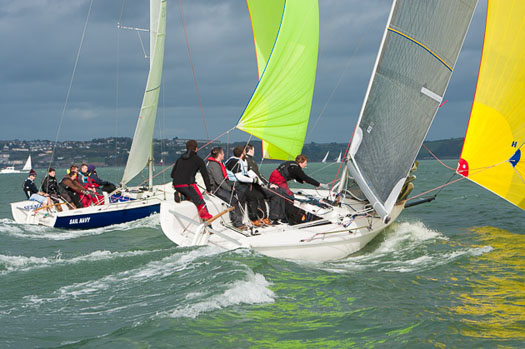
All in all a splendid day of racing that left the sailors exhausted but exhilarated and in fine fettle coming ashore for the presentation of the day prizes and later to the overall prize giving dinner which proved to be a total sell out, a resounding success, and a great end to this superb Autumn series. Another great day of sailing (yesterday) to wrap up the finale of the CH Marine Autumn Series at the Royal Cork Yacht Club
The forecast wind was W/SW 14 to 24knots and nobody could dispute that it was incorrect. Whitesail 1 and 2 and Class 4 were with RO David O'Brien and team who set up a line down off Whitegate and sent off Class 4 first, having waited while the Brittany Ferries Bretagne passed inward bound on her way to Ringaskiddy. The Class were a little bit unfortunate that an anchored vessel decided to up anchor and do a 360 degree turn leaving the fleet to get out of her way which they did with alacrity. Simultaneously WS2 were also starting and they two had to get out of the ship's way,
Class 1 then went for their start. Indulgence went for a pin end start but wasn't quite fast enough and got caught on starboard by the wily Michael Wallace sailing Felix. The first mark was No. 10 and Yoshi made a mistake and overstood the mark by a good distance and had to return.
Your scribe's researcher then went out to watch the 1720s sailing. They were doing windward/leeward courses across the harbour at great speed so much so that the third race had a yellow flag flown to indicate they would use smaller JIbs and small spinnakers.
Meanwhile Classes 1, 2 and 3 sailed outside the harbour. The first race was a windward/leeward course. The second race was windward/leeward with a two sail reach into Western mark and then into the harbour where Sparetime was anchored off the Cage to finish the fleet.
All in all a splendid day of racing that left the sailors exhausted but exhilarated and in fine fettle coming ashore for the presentation of the day prizes and later to the overall prize giving dinner which proved to be a total sell out, a resounding success, and a great end to this superb Autumn series.
